In 2020, JPMorgan Chase & Co. launched the New Skills ready network across six domestic sites to improve student completion of high-quality career pathways with a focus on collaboration and equity. As a national partner in the New Skills ready network, Advance CTE strives to elevate the role of state capacity and resources in advancing project priorities and gain a unique perspective on promising practices to strengthen state-local partnerships across the country.
This blog series highlights innovative tools and initiatives produced across the six sites that advance the initiative’s four key priorities and serve as a guide for state leaders in their work to create cohesive, flexible and responsive career pathways.
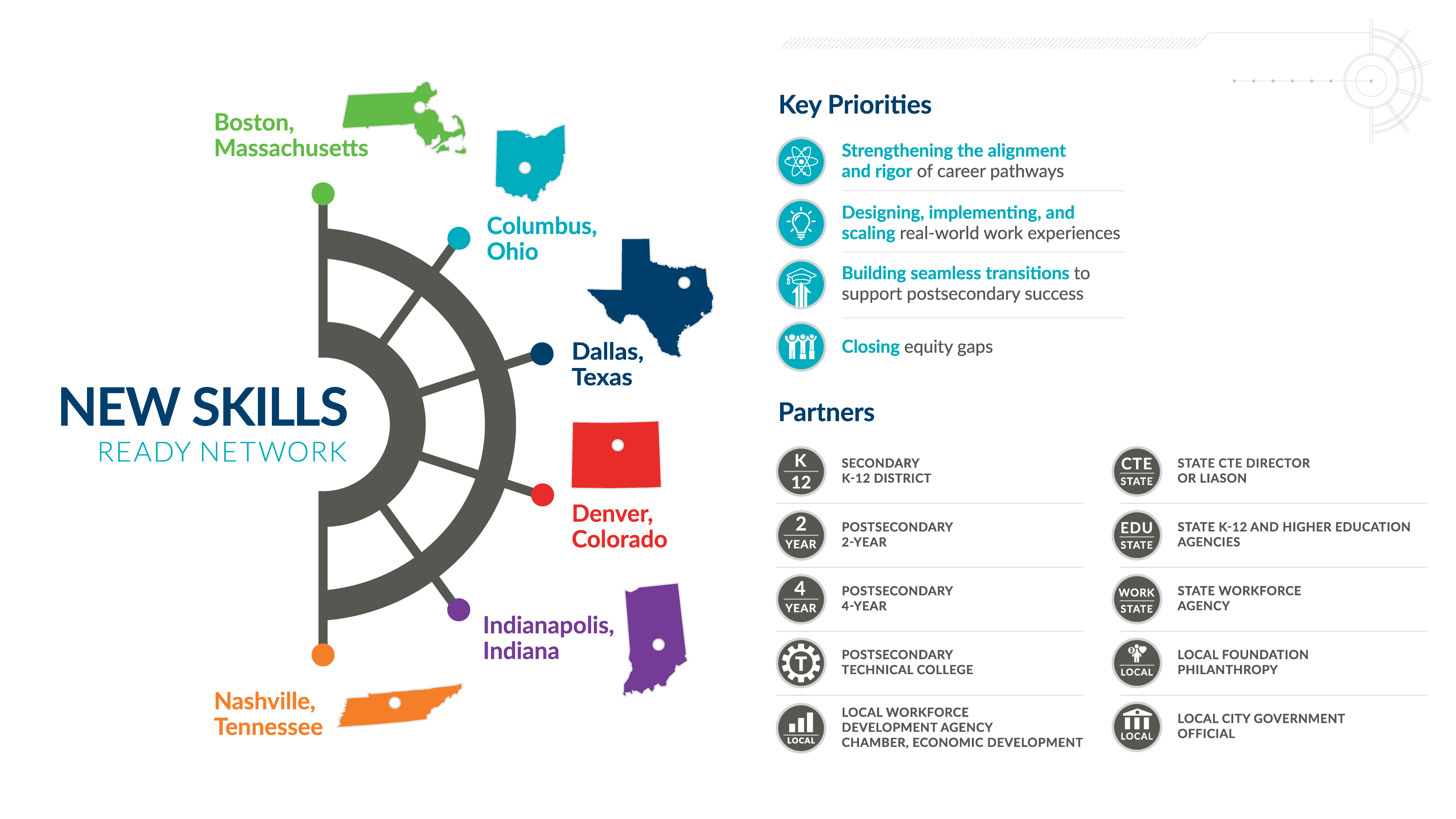
For this post, Senior Policy Associate Jeran Culina interviewed two leaders from the Scarlett Family Foundation, Consultant Jenny Mills McFerron, and COO Tom Parrish to learn more about the career advising framework in development for four Metro Nashville Public Schools (MNPS) high schools with the goal to scale it to all MNPS-zoned high schools in future years.
Purpose and Components
Too few learners in Nashville have access to consistent advising experiences across secondary, postsecondary and community-based levels. When systems fail to provide students with equitable and high-quality career advising, they make it challenging for students to skillfully navigate a path to career and college success. Additionally, education leaders lack access to fully integrated data to track and evaluate learner outcomes.
With this in mind, Nashville’s New Skills ready network team is creating a career advising framework that seeks to provide a seamless and consistent career advising experience across K-12, postsecondary, and community offerings through shared language and practices as well as intentional spaces for counselors and other advising professional to share best practices as the framework is implemented.
At the same time, Nashville is pursuing an initiative to place college and career counselors at secondary and postsecondary institutions, with equity being a leading factor in the pilot schools’ selection. Four college and career advisors have been placed at the four high schools participating in the New Skills ready network grant to advance high-quality advising with the intention of eventually scaling these efforts to all Metro Nashville public school high schools. These positions will support the existing advising staff and actively share their experience with site partners to inform the career advising framework.
Unique Features
Nashville’s approach to this work is unique in several respects:
- Community Relationships: Community organizations in Nashville have robust offerings for community-based advising programs and a strong relationship with MNPS.
- Research: Prior to launching this initiative, the project team worked with Advance CTE to collect best advising practices from around the country as well as conduct a regional landscape study of existing advising practices at the community and district level.
- Systemic Alignment: This initiative intentionally focuses on connecting career advising at not only K-12 and postsecondary levels but also community-based advising and mentoring programs.
Vision for Success
The Scarlett Family Foundation strives to facilitate the development of a framework across the K-12, postsecondary, and community systems that would support each Nashville learner’s ability to successfully access high-wage, high-demand jobs.
For the framework itself, McFerron strives for this model to create consistent and systemic advising transition points for each learner from middle school, high school and postsecondary stages, provide adequate support for learners to smoothly navigate these transition points, and ultimately improve student outcomes. She also elevated the importance of involving more stakeholders in career advising support, including teachers and administrators, to provide much-needed capacity for advising.
“We want to see continuous improvement over the very long term and have that success sustained and built upon over time, and helping students successfully navigate [key education] transition points is critical to that.” – Jenny Mills McFerron, Scarlett Family Foundation
Next Steps and NSrn Impact
The next phase will focus on collecting input from a variety of stakeholders, including learners and their families. Three affinity groups consisting of K-12, postsecondary, and community organization leaders will provide during the formulation and execution of the framework as a draft is written over the next six months.
Parrish praised the New Skills ready network’s focus on long-term, sustained change as a key benefit of the site’s involvement that he hopes will reverse the recent cycle of short bursts of progress that are not realized for each learner.
“I think doing this grant over five years with its intentional focus, you are forced to come back to talk about what’s working and what is not working, and over time you spread and institutionalize some of these practices, tweak them as needed, and ultimately provide the evidence that this model is working even as other initiatives and people come and go.” – Tom Parrish
For more information about the early accomplishments of Nashville and the five other sites that are part of the New Skills ready network, view Advance CTE’s Year One snapshots. Previous entries for this series highlighting Indianapolis’ pathways evaluation framework can be found here.
For more resources on advancing quality and equity in career advising, visit the Learning that Works Resource Center.
Stacy Whitehouse, Senior Associate for Communications and State Engagement


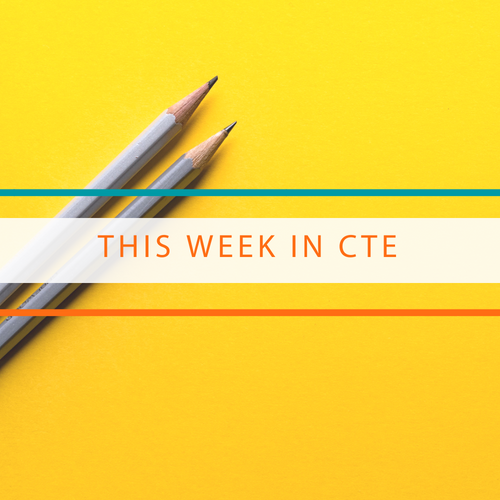 Developed with input from nearly 200 national, state and local education and workforce development leaders and supported by over 40 national organizations,
Developed with input from nearly 200 national, state and local education and workforce development leaders and supported by over 40 national organizations,  Meet Christina Koch! Christina serves in the role of Policy Associate for Advance CTE. Christina works on projects related to state policy, including the New Skills
Meet Christina Koch! Christina serves in the role of Policy Associate for Advance CTE. Christina works on projects related to state policy, including the New Skills Today, Advance CTE and Education Strategy Group (ESG) released an
Today, Advance CTE and Education Strategy Group (ESG) released an 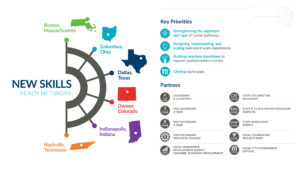
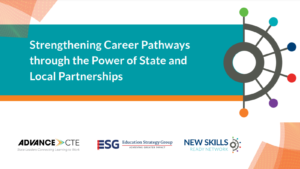 Intentional and early collaboration between state and local leaders is vital to ensuring success in high-quality career pathways for all learners.
Intentional and early collaboration between state and local leaders is vital to ensuring success in high-quality career pathways for all learners. 
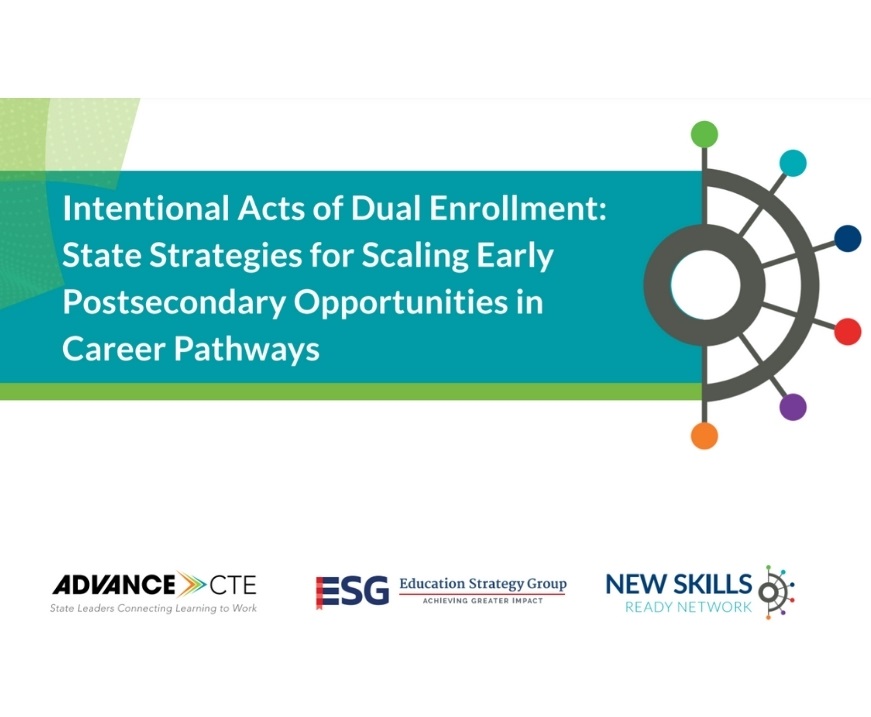 Two hallmarks of a high-quality career pathway are seamless transitions across secondary and postsecondary education and offering learners the opportunity and means to participate in early postsecondary opportunities (EPSOs) – which include dual enrollment, dual credit, concurrent enrollment and other related opportunities. It is critical that these opportunities seamlessly result in articulated postsecondary credit for learners in a degree program that will help them progress on their chosen career pathway with no hidden barriers.
Two hallmarks of a high-quality career pathway are seamless transitions across secondary and postsecondary education and offering learners the opportunity and means to participate in early postsecondary opportunities (EPSOs) – which include dual enrollment, dual credit, concurrent enrollment and other related opportunities. It is critical that these opportunities seamlessly result in articulated postsecondary credit for learners in a degree program that will help them progress on their chosen career pathway with no hidden barriers.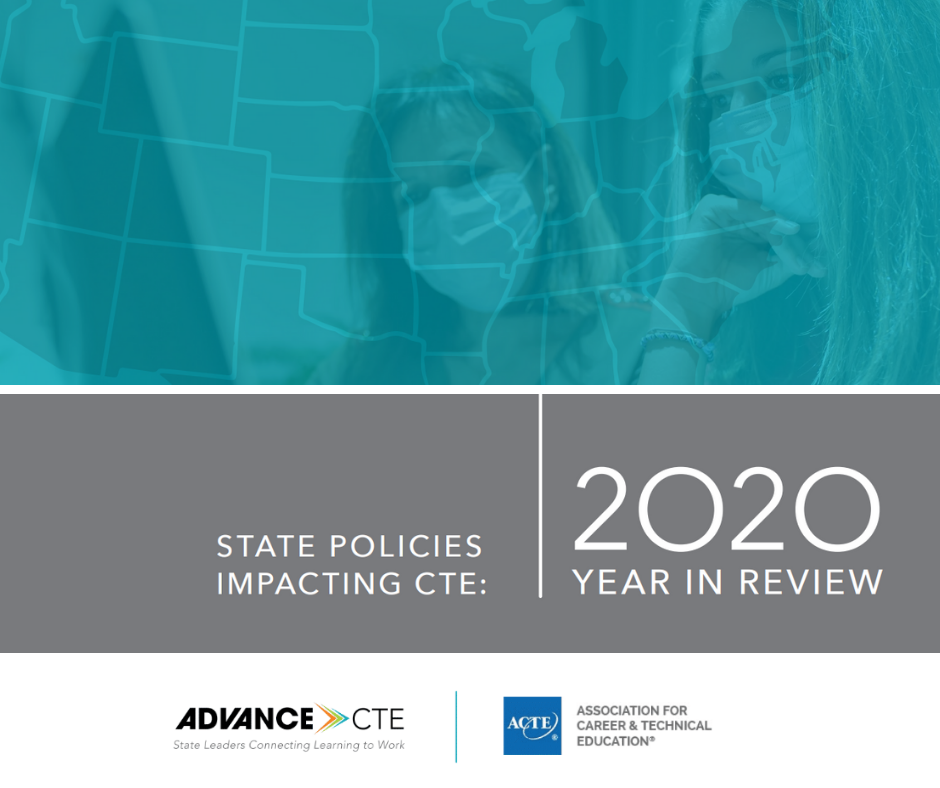 On the state and federal level, COVID-19 (coronavirus) fundamentally changed the conversation about education, significantly disrupting and refocusing state legislatures. Despite this, Career Technical Education (CTE) adapted to the challenges brought about by the coronavirus, continuing to deliver high-quality programming nationwide across all learner levels despite significant disruptions to education delivery. Because the pandemic was on the forefront of federal, state and local governments’ agendas, fewer policies and budget provisions for CTE were enacted than in previous years; in calendar year 2020, 31 states enacted or passed 67 policy actions related to CTE and career readiness.
On the state and federal level, COVID-19 (coronavirus) fundamentally changed the conversation about education, significantly disrupting and refocusing state legislatures. Despite this, Career Technical Education (CTE) adapted to the challenges brought about by the coronavirus, continuing to deliver high-quality programming nationwide across all learner levels despite significant disruptions to education delivery. Because the pandemic was on the forefront of federal, state and local governments’ agendas, fewer policies and budget provisions for CTE were enacted than in previous years; in calendar year 2020, 31 states enacted or passed 67 policy actions related to CTE and career readiness.